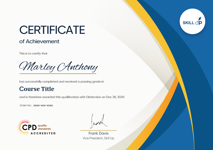Physical Intervention Skills: Techniques and Best Practices for Door Supervisors
Special Sale| CPD Accredited| FREE PDF Certificate & Transcript | Lifetime Access| Tutor Support | Free Exam
Skill Up
Summary
- Certificate of completion - Digital certificate - Free
- Certificate of completion - Hard copy certificate - £9.99
- Exam(s) / assessment(s) is included in price
- Tutor is available to students
Add to basket or enquire
Overview
Master the essential physical intervention skills needed to excel as a door supervisor with our comprehensive training course. Learn effective techniques for conflict management, acquire crucial door supervising skills, and gain proficiency in first aid and health and safety practices. Join us on this transformative journey and become a confident and capable door supervisor in the private security industry.
Learning Outcomes:
- Understand the private security industry, its regulations, and the role of a door supervisor within this sector.
- Develop essential door supervising skills, including crowd control, access control, and customer service.
- Learn conflict management strategies specific to the private security industry, ensuring safe and secure environments.
- Acquire physical intervention techniques to safely and effectively handle challenging situations and protect oneself and others.
- Gain knowledge of health and safety regulations and best practices relevant to the private security profession.
- Learn basic first aid techniques to provide immediate assistance in emergency situations.
CPD
Course media
Description
In the fast-paced world of door supervising, having the right skills and knowledge is crucial to maintaining safety and order in various establishments. Our course, "Physical Intervention Skills: Techniques and Best Practices for Door Supervisors," is designed to equip aspiring and existing door supervisors with the expertise needed to excel in this demanding role.
Through a series of comprehensive modules, you will be introduced to the private security industry and gain an understanding of the specific responsibilities and challenges faced by door supervisors. Dive into conflict management strategies, learning to defuse and manage potentially volatile situations effectively. Explore physical intervention techniques, ensuring you have the skills to handle and restrain individuals when necessary safely.
Additionally, the course covers essential topics such as health and safety for security professionals and basic first aid techniques. You will acquire the knowledge and tools to respond promptly and appropriately to emergencies, providing vital assistance when it matters most.
Ideal for aspiring door supervisors or those seeking professional development, this course offers a pathway to a rewarding career in the private security industry. Join us today and gain the skills and confidence to excel in the dynamic field of door supervising.
Who is this course for?
The target audience for the course is:
- Individuals aspire to become door supervisors in the private security industry.
- Existing door supervisors seeking to enhance their skills and knowledge.
- Security professionals are looking to specialise in door supervision.
- Venue owners and managers are interested in understanding the responsibilities of door supervisors.
- Individuals interested in pursuing a career in the private security industry.
Career path
Our course will prepare you for a range of careers, including:
- Door Supervisor: £20,000 - £25,000 per annum
- Head Door Supervisor: £25,000 - £30,000 per annum
- Security Team Leader: £30,000 - £35,000 per annum
- Security Manager: £35,000 - £45,000 per annum
- Security Operations Manager: £45,000 - £60,000 per annum
- Security Director: £60,000+ per annum
Questions and answers
Currently there are no Q&As for this course. Be the first to ask a question.
Certificates
Certificate of completion - Digital certificate
Digital certificate - Included
Certificate of completion - Hard copy certificate
Hard copy certificate - £9.99
Inside the UK student have to pay an additional delivery fee of £10, whereas International students are required to pay an additional fee of £19.99 to receive a hard copy of the certificate delivered to their address.
Reviews
Currently there are no reviews for this course. Be the first to leave a review.
Legal information
This course is advertised on reed.co.uk by the Course Provider, whose terms and conditions apply. Purchases are made directly from the Course Provider, and as such, content and materials are supplied by the Course Provider directly. Reed is acting as agent and not reseller in relation to this course. Reed's only responsibility is to facilitate your payment for the course. It is your responsibility to review and agree to the Course Provider's terms and conditions and satisfy yourself as to the suitability of the course you intend to purchase. Reed will not have any responsibility for the content of the course and/or associated materials.



